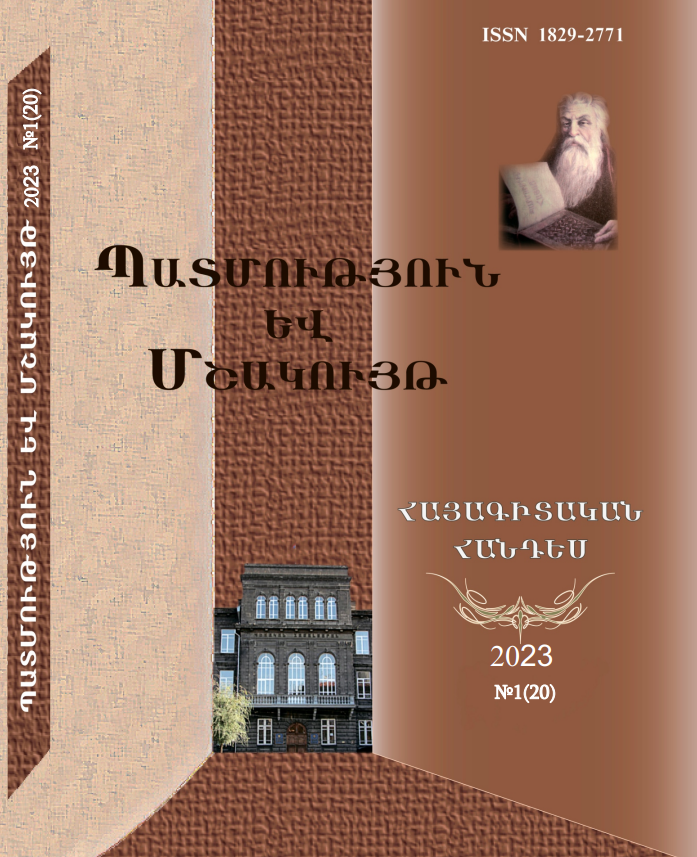Կորեական ինքնության ձևավորումը և կերպափոխումը
DOI:
https://doi.org/10.46991/hc.2023.20.2.150Keywords:
Կորեական թերակղզի, ինքնություն, ազգ, մշակույթ, արժեհամակարգ, կոնֆուցիականություն, գաղութատիրությունAbstract
Հոդվածում ուսումնասիրվում են կորեական ինքնության տիպաբանությունն ու պատկերացումները։ Դիտարկվում է կորեական ինքնության կերպափոխումը պատմական գործընթացների ազդեցությամբ, մասնավորապես Ճապոնիայի վարած քաղաքականության հետևանքները, որով փորձում էին կորեական ազգը ձուլել ճապոնականին և թույլ չտալ կորեական ինքնության վերածնունդը, իսկ անկախության կորուստն ստիպեց կորեական ազգին գնալ ինքնության կերպափոխման ճանապարհով՝ կլանելով արևմտյան ու արդիական արժեքները։ Ինչպես նաև անդրադարձ է կատարվում կոնֆուցիական արժեքներին որպես կորեական ազգային ինքնության գիտակցության հիմք։ Վերլուծվում են կորեական ինքնությունները՝ վեր հանելով նմանություններն ու առանձնահատկությունները։
References
Գրականության ցանկ
Anderson B. (2006), Imagined Communities Reflections on the Origin and Spread of Nationalism, London, Verso, 240 p.
Armstrong C. (2004), The North Korean Revolution, 1945-1950, Cornell University Press, 265 p.
Chung Y. S. (2011), Identity Politics in the Democratic People’s Republic of Korea (DPRK), The Review of Korean Studies, Vol. 14, No. 3, 101-120 p.
Denney S., South Korean Identity: The Return of Ethnic Exclusivism?
https://sinonk.com/2016/10/28/south-korean-identity-the-return-of-ethnic-exclusivism/, 12.03.2023
Han K. K. (2003), The Anthropology of the Discourse on the Koreanness of Koreans, Korean Journal, Vol. 43, No. 1, 5-31 p.
Heo J. Y. (2020), Contentious Narratives on National Identity of South Korea: How to Understand the Self and the Significant Others, North Korea and the United States, Berlin, 303 p.
Hobsbawm E. (2012), Nations and nationalism since 1780: programme, myth, reality, Cambridge University Press, 206 p.
Hyung I. P. (2020), Constructing “Korean” Origins: A Critical Review of Archaeology, Historiography, and Racial Myth in Korean State-Formation Theories, Harvard University Asia Center, 543 p.
Kim A. S. (2022), Rebuilding Lost Identity: Rethinking Korean Reunification as an Imagined Community of Shared National Identity, UCLA Pacific Basin Law Journal, Vol. 39, No. 1, 61-98 p.
Kim J. (2014), National Identity and Attitudes Toward North Korean Defectors, Joint U.S.-Korea Academic Studies, Vol. 25, 95-111 p.
So K. (2012), The formation of the South Korean identity through national curriculum in the South Korean historical context: Conflicts and challenges, International Journal of Educational Development, Vol. 32, Issue 6, 797-804 p.
Villanueva O. (2020), Alternative Views: Korean Identity, College of East Asian Studies, Capstone, 1-25 p.
김종만, 김은기 (2020), 가치관을 통해 본 한국인의 문화적 정체성: 유교와 무교를 중심으로, 신학과 사회, 제34권 3호, 193-235
김정일 (1982), 주체사상에 대하여, 조선로동당출판사, 86
임형백 (2010), 한국인의 정체성의 다문화적 요소: 역사-인류학적 해석, 다문화와 평화, 제4 권 2 호, 10-43
References
Kim Jong Man, Kim Eungi (2020), Gachigwaneul tonghae bon hanguginui munhwajeong jeongcheseong: yugyowa mugyoreul jungsimeuro, Sinhakgwa sahoe, je34 gwon 3 ho, 193-235 (in Korean)
Kim Jeong Il (1982), Juchesasange daehayeo, Joseollodongdangchulpansa, 86 (in Korean)
Im Hyeong Baeng (2010), Hanguginui jeongcheseongui damunhwajeong yoso: yeoksa-illyuhakjeong haeseok, Damunhwawa pyeonghwa, je4 gwon 2 ho, 10-43 (in Korean)
Downloads
Published
Issue
Section
License
Copyright (c) 2023 Anna Tomeyan

This work is licensed under a Creative Commons Attribution-NonCommercial-ShareAlike 4.0 International License.

